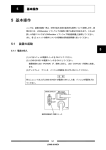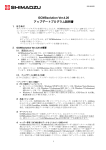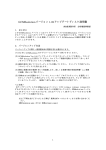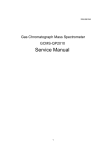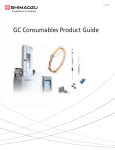Download Chromatopac Data Processor for Chromatography
Transcript
C191-E001E Chromatopac Data Processor for Chromatography C-R8A En ha nc e d da t a p r o c e s s i n g f u n c t i o n s in a compact unit The data processing functionality of the highly-acclaimed Chromatopac line is now even more advanced. The superior C-R8A Chromatopac Data Processor is equipped with improved automated validation functions and network compatibility. Inherits tthe he proven Shi Shimadzu m adzu Chromatop Chromatopac ac a algorithms lgorit hms The numerous peak processing functions and quantitative calculations from previous models (C-R4A, C-R5A, C-R7A) are included in the C-R8A. Includes automated validation functions The hardware validation software (accessed with the VP key) supports GLP/GMP and ISO requirements. Supports full network capability The C-R8A includes a high speed RS-232C port (19,200 bps) as standard for networking through CLASS-Agent and Chromatopac Manager software programs. Designed for universal applications Both novices and experts can make full use of the C-R8A's considerable functionality. 2 Flexibly accommodates both stand-alone and networked systems Both RS-232C and fiber optic interfaces (one each) are provided as standard equipment. Connection to a PC and to analytical instruments is easily accomplished. Accessory terminal Signal input terminal RS-232C terminal Fiber optic terminal SD card drive is offered as standard equipment. PC Ne t w or k Configur at i on Exam pl e Office Laboratory Automated collection functions using Agent Server LCsolution + CLASS-Agent LCMSsolution + CLASS-Agent GCsolution + CLASS-Agent GCMSsolution + CLASS-Agent Managing analysis data Ethernet Approval, reprocessing instrument Execute authorization Review chromatograms/perform statistical analysis C-R8A PACsolution C-R7A plus 3 Features Basic Functions The renowned Chromatopac data processing functions have now been further enhanced ● The Chromatopac's peak processing and quantitation algorithms are pivotal to all C-R8A functions. This real-time, multitasking operating system ensures both the unerring acquisition of broad or sharp peaks as well as the accurate and precise calculation of peak area and retention time. ● Asynchronous data processing can be performed on up to 2 channels. Ease of Operation Operation is easy with a 2-level menu and Navigation Help ● Switch from a Typical menu displaying the minimum required analysis parameters to a Detailed menu, containing advanced Menus contain different analysis parameter levels Basic Menu Detailed Menu settings. Perform only the operations necessary for the analytical requirements. ● A newly added Navigation Help feature greatly eases the learning curve for quick mastery of the operations. Peak Processing Parameters Peak Processing Parameters Quantitation Parameters Quantitation Parameters ID Table ID Table Comment Time Program Event Program Option Parameters Plot Parameters Report Parameters Multi Standards Data Storage Increased main unit memory capacity, SD card drive and high performance AF paper printer — all standard ● With greatly increased internal memory (1 MB over the previous model) and a SD card* disk drive, all data can be easily stored. Naturally, all data from previous Chromatopac models can be read. ● In addition to economical thermal paper, the printer also supports the use of AF (Anti-Fade) paper, which can be stored without fading for at least 20 years. * In case of using normal SD card, format of SD card is required with the supplied software. 4 Automation Analysis can be further automated with Chromatopac BASIC programming ● Using Chromatopac BASIC programs, a wide range of system Configuration of user program functions can be automated, such as: controlling peripheral Settings Pretreatment Analysis Pretreatment program Time program Calculations based on analysis results accessories, monitoring the instrument status, performing calculations based on analysis results, creating analysis reports, and transmitting data to a higher level PC. ● Passwords can be used to lock analysis files or BASIC programs. ● Switch between sampling lines with a pretreatment program, and control external accessories prior to the start of analysis. Channel 1 Event program Pretreatment program Time program Channel 2 Event program BASIC program Convenient Functions The C-R8A is loaded with useful functions, including continuous automated reprocessing and keyboard history Continuous Reprocessing Command Allocation Command Allocation example: rewrite an analysis file at the touch of a key Preparation COMMAND Compile registration file 1 completes rewrite ● The C-R8A comes with a wide variety of convenient functions, such as continuous automated reprocessing of acquired data, recall of previous keyboard entries, and access to a keyboard history of editing operations. ● Using the Command Allocation function, up to 20 BASIC commands can be assigned to the keyboard numeric keys, for the simplest command execution. Documentation Basic Operation Manual, Pocket Reference and detailed User's Manual on CD-ROM all included ● Operational procedures, as well as the many functions, are thoroughly explained in the Basic Operation Manual and the detailed User's Manual on CD-ROM*. The Pocket Reference serves as a convenient guide when detailed procedures are not required. ● The CD-ROM allows keyword searches for the fast, easy location of functions. * PDF file format: requires appropriate reader program C-R8A Chromatopac Data Processor for Chromatography 5 Enhanced automated validation functions facilitate regulatory compliance VP key provides validation support System Information One-touch access to system program version information, instrument serial number, validation results. Operation Log Displays the operating status of each channel (analysis status, BASIC program/Event program/Pretreatment program operation status), and keeps a log of keyboard operations. Error Log If an error is generated, it is recorded in the instrument log so you can determine the appropriate remedial measures. H ardware validation support The C-R8A includes hardware validation software, which is easily executed using a preset procedure. The validation results which can be recorded in the instrument are compiled in a fixed report format for simple verification and storage. Software validation support The C-R8A incorporates software validation functionality. Basic validation is executed by simply selecting a menu item. These validation results are also compiled in a fixed report format, allowing for simple verification and storage. 6 System Configuration Examples The Chromatopac C-R8A can be used in the following types of system configurations. 1 Digital link using optical cable (Processing for up to 2 channels) Digital data transmission between the C-R8A and a system with a fiber optic cable connection (for example, SCL-10Avp) requires only the fiber optic cable. Data processing can be performed for up to 2 channels in this configuration.* * Only one system can be connected by digital link. In this configuration, data processing can be conducted for either 1 channel or 2 channels simultaneously. FFiber optic cable C-R8A 2 Instrument supporting digital link Analog signal line connection (Processing for up to 2 channels) Conventional detectors are normally equipped with an analog output terminal, so all that is required is an analog signal line connection to the C-R8A for asynchronous data processing for up to 2 channels. In this configuration, processing for the second channel requires an optional 2-channel board. 2-channel board option Analog signal nal line CH1 Instrument with analog signal output 3 Analog signal line CH2 Instrument with analog signal output C-R8A Connection using fiber optic cable and analog signal line (Processing for up to 2 channels) The C-R8A comes equipped with both an analog signal output terminal and a fiber optic cable terminal, enabling the type of configuration shown in the following figure (for asynchronous data processing for up to 2 channels). FFiber optic cable nal Analog signal line CH1 Instrument with analog signal output C-R8A Instrument supporting digital link C-R8A Chromatopac Data Processor for Chromatography 7 Data Management and Reprocessing using a PC Chromatopac Manager The C-R8A contains a high speed RS-232C board (19,200 bps). System configurations can include a PC when the Chromatopac Manager is also installed. S y s te m C o nfi g u ra tio n E x a mp les One PC can be connected to up to 8 analytical systems. C-R8A C-R8A Features C-R8A data can be managed and re-analyzed from a PC. Automated collection and conversion of analytical data Data transmission to a PC is greatly facilitated. Data from the C-R8A can be automatically collected by the PC, and simultaneously converted to ASCII file format. Data management and reprocessing from a PC Data collected by a PC can be re-analyzed using the Chromatopac Manager software installed on the PC. The data can then be opened in commercial software applications (such as MS-Excel) for convenient report generation. 8 C-R7A plus Database Management Software Simplifies Network Usage CLASS-Agent The CLASS-Agent database management software handles data from the C-R8A (as well as previous Chromatopac versions) over a network. System Configuration Office Laboratory Automated collection functions using Agent Server Ethernet Approval, reprocessing instrument LCsolution + CLASS-Agent LCMSsolution + CLASS-Agent GCsolution + CLASS-Agent GCMSsolution + CLASS-Agent Execute authorization Review chromatograms/perform statistical analysis Features C-R8A data, including analysis results, are efficiently managed in a database. Analysis results automatically registered in the database Data generated by an LC, GC, or balance are automatically collected and registered in the database, for easy management of large amounts of data. Full data search functionality The built-in data search functionality quickly locates desired data. GLP/GMP support functions Security is ensured by limiting data review according to users. Audit trail functionality is provided through automated maintenance of an operation log. C-R8A Chromatopac Data Processor for Chromatography 9 Optional Accessories Various accessories are available for the C-R8A. T h e C - R 8 A u n i t i s e q u ip p ed wit h 2 o p t io n slo t s f o r t h e i nstal l ati on of opti onal boards. PC-55N 2-channel board PC-57N 3-channel optical link interface (223-03507-91) (223-03727-91) Required for performing dual channel Optional fiber optic link board equipped with simultaneous processing. 3 channels. PC-16N Digital I/O board PC-17NS Interface (221-21193-91) (223-04593-91) Equipped with 8 digital signal inputs Required for connection n of the (input current 0.20 mA) and 8 digital PRG-102A Controller. signal outputs (lead relay contact point outputs), this board is used for delivering and receiving signals and for remote instrument control. Up to 4 digital I/O boards (32 inputs and 32 outputs) can be used. PRG-102A* External Instrument Controller SEL-2 Input Selector ctor itch) (with remote switch) (221-17084-90) (221-26823-90) Build an automated analysis system. Connect the PRG-102A to the C-R8A to Connects up to 4 chromatographs at a time, selecting one of the signals for control solenoid valves, gas sampling valves, backflush valves, etc., and perform collection. It can also start a Chromatopac placed up to 5 meters away. (As there operations such as automated sample injection, column switching and signal is no Stop switch, the Chromatopac must be stopped either by specifying a time switching. with the STOP.TM command or by manually pressing the STOP key on the Power relay contact outputs: 5 (3 of which are designated for standard valves) Chromatopac. Miniature relay contact outputs: 3 *The PRG-102A requires a PC-17NS interface (2 PRG-102A units per PC-17NS). 10 Specifications Spec i fi c ati o n s Number of input channels M ainbody Digital signal inputs: 2ch (standard) Analog signal inputs: 1ch (standard), 2ch (option) Input voltage range -5mV to 1V Peak processing Processing peak number: About 1000 max. Minimum peak width processed: 0.04 second (width at half height) Reprocessing: With different parameters. Continuous reprocessing possible. Identification Absolute retention time method, relative retention time method, multi-reference method, time band method, time window method, elution order method. Maximum peak number for identification: about 1000 Description P/N 221-80450 -32: 120V -38: 230V C-R8A Cons um ables and Opt ional A c c es s or ies Description P/N Thermal Chart Paper, Normal, 10 rolls 223-04230-81 Thermal Chart Paper, Anti-Fade type, 10 rolls 223-04231-81 Thermal Chart Paper, Normal, Z-folded type 223-04232 Thermal Chart Paper, Anti-Fade type, Z-folded type 223-04233 Formatted SD Card (1 incl.) 221-80503-91 2 slot expansion case for C-R8A 223-04592-91 Analog signal cable, 3 m (1 incl.) 221-25536-90 Fiber optic cable, 1 m 070-92025-51 Fiber optic cable, 2 m 070-92025-52 SD Drive (MicroSD, SDHC standard or higher, compliant with SPI mode) MS-DOS format 1.44 MB (2HD) ×100 Fiber optic cable, 3 m 070-92025-53 Fiber optic cable, 5 m 070-92025-54 Interfaces Opt link: 1ch, RS-232C: 1ch RS-232C Cable, 2 m 228-35397-92 Option slots 2 slots RS-232C Cable, 3 m 228-35397-93 Display LCD 40 characters × 2 lines, with back light, for key board entries and status monitors RS-232C Cable, 5 m 228-35397-95 RS-232C Cable, 10 m 228-35397-90 Printer Parallel thermal head system Chart paper: 210 mm × 50 m (roll type), 210 mm × 2000 pages (300 mm/ page, Z-folded type) Recording speed: 1 to 100 mm/min RS-232C Cable, 9-25pin, 2 m 228-35398-42 2-channel Board, PC-55N 223-04202-41 Optical/RS-232C Interface, PC-56N 223-02983-92 3-channel Optical-Link Interface, PC-57N 223-03727-91 Digital I/O port, PC-16N 221-21193-91 PRG-102A, Programmer 221-17084-90 Interface, PC-17NS 223-04593-91 SEL-2, Input selector 221-26823-90 6 slot expansion case for C-R8A 221-25541-90 Analog Cable, Wide PLUS 221-47251-41 Analog Cable, Linear PLUS 221-47251-42 Code, C-R3A∼GC-8A 3 m 221-26918-91 R8A Template for R5A/R6A 221-80501-91 Quantitative calculations Calibration curve Disk drive Area normalization method, corrected area normalization method (with or without scale factor), internal standard method, multi-internal standard method, external standard method, exponential calculation method, grouping. 1-point method, 2-point method, least squares linear regression (15 points), multi-linear methods (15 points), calibration curve plot. User programs Chromatopac BASIC, time program, event program, sample pretreatment program. Performance Dynamic range: 106 (108 for wide-range FID of the GC-17A) Integration sensitivity: 0.1μV × sec. Linearity: Less than 0.1% Repeatability: Coefficient of variation: 0.1% for area, less than 0.5% for height (Conditions: 1 mV peak height, 20 sec. Half value height, 1 day) Installation Requirements Dimensions and weight Power: AC 100 to 240 V, ±10%, 50/60 Hz, 30 VA (normal), 70 VA (maximum) Temperature: 5 to 35 ˚C Humidity: 30 to 80% (No condensation) W340 × D380 × H150 mm About 5 kg C-R8A Chromatopac Data Processor for Chromatography 11 C-R8A Company names, product/service names and logos used in this publication are trademarks and trade names of Shimadzu Corporation or its affiliates, whether or not they are used with trademark symbol “TM” or “®”. Third-party trademarks and trade names may be used in this publication to refer to either the entities or their products/services. Shimadzu disclaims any proprietary interest in trademarks and trade names other than its own. For Research Use Only. Not for use in diagnostic procedures. The contents of this publication are provided to you “as is” without warranty of any kind, and are subject to change without notice. Shimadzu does not assume any responsibility or liability for any damage, whether direct or indirect, relating to the use of this publication. www.shimadzu.com/an/ © Shimadzu Corporation, 2015













